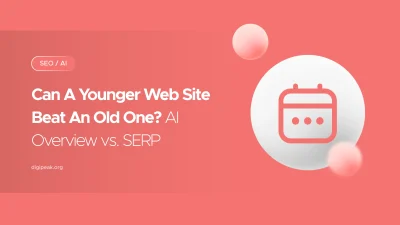
Can A Younger Web Site Beat An Old One? AI Overview vs. SERP
The digital marketing ecosystem in 2026 is defined by a singular, disruptive question: Is the …
SEO -
26/05/2025 -
13 dk okuma
Stay up to date with Peakers
When it comes to digital marketing, especially SEO, we can say that new concepts and technologies are constantly being developed. This time, the development is Generative Engine Optimization (GEO), which will fundamentally change our approach to search engine optimization.
GEO, which combines traditional SEO with generative models for better search results, signals a significant shift from traditional SEO practices and is poised to redefine content visibility in AI-generated search engine suggestions.
In this article, we will discuss GEO, the importance of adapting to new AI-driven search algorithms, and the significance of leveraging strategies such as keyword optimization, adding statistics, and fluency optimization. With this detailed guide and step-by-step strategies, we will accelerate your online success. Enjoy the read.
Generative Engine Optimization (GEO) refers to the process of optimizing AI models and algorithms.
GEO is not just about being found through search engine optimization (SEO); it is about dominating the digital space through queries and questions in generative AI results.
With GEO, you leverage the unique potential of AI by creating core content that not only impacts your target audience but also machines that navigate the web and use it to inform their outputs.
GEO is the act of optimizing the content on your site to be more suitable for scanning and use as a source by a language learning model (LLM).
Concept: GEO refers to the optimization of online content for better visibility and performance in search engines that use generative AI technologies. This involves understanding how generative AI models interpret and prioritize content and then adapting the content to align with these parameters.
Applications: This includes optimizing content to be more easily summarized by AI, structuring content in a way that generative models can understand and prioritize, or creating content that directly answers questions preferred by AI-driven query responses.
Focus: GEO targets content creators and marketers aiming to improve their content’s performance in search results in an era where search engines leverage AI to generate responses.
“However, the recent success of large language models (LLMs) has paved the way for better systems like BingChat, Google’s SGE, and perplexity.ai, which combine the power of traditional search engines with the flexibility of generative models. We call these new-era systems Generative Engines (GE)because they not only search for information but also generate multimodal responses by synthesizing multiple sources.”
Here’s a look at perplexity.ai, a chatbot-style search engine:
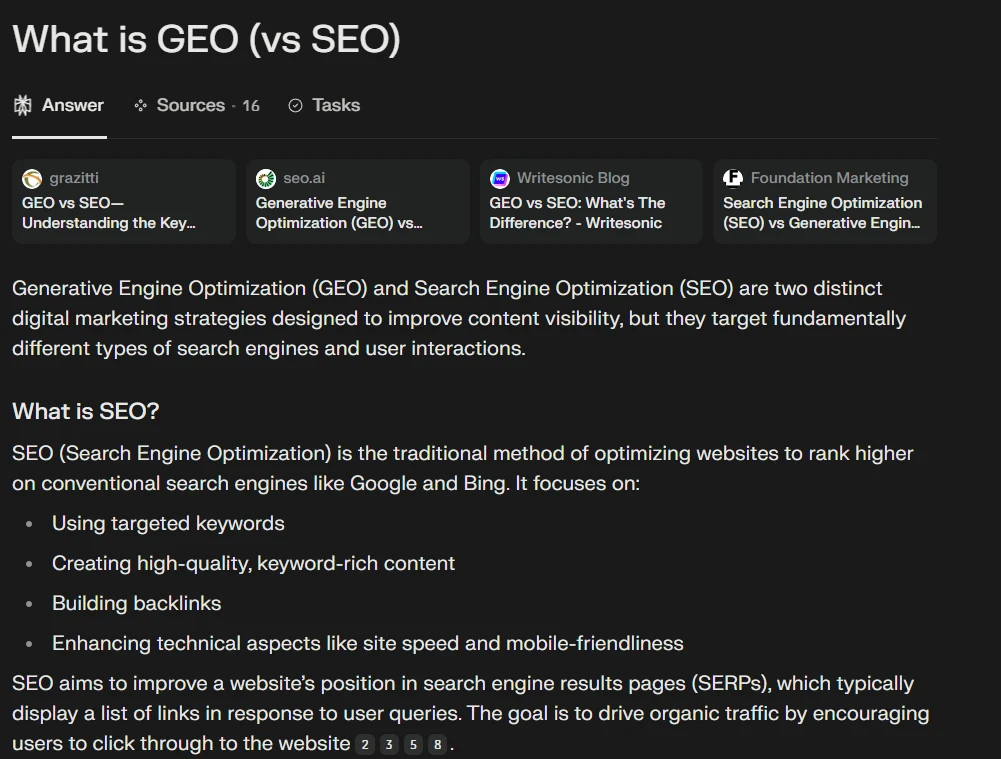
In other words, this approach combines the power of traditional SEO techniques with the flexibility and sophistication of generative engines like Google’s Search Generative Experience (SGE).
So, what powers these AI search engines? A combination of complex, data-driven technologies.
First, AI-powered algorithms help prioritize content relevance and user intent, enabling generative engines to prioritize content relevance and deliver better search results.
Additionally, natural language processing (NLP) models analyze and understand human language in terms of parts of speech, named entities, and sentiment to understand search queries and generate human-like text. Machine learning algorithms use datasets to understand user behavior, continuously learn to improve search results and rankings, and optimize content based on what users find most valuable or engaging.
To fully understand GEO, it’s helpful to see how it interacts with digital content and search technologies, especially the integration of AI:


SEO is a widely recognized strategy focused on improving websites to achieve higher rankings on traditional search engine results pages (SERPs). This optimization technique includes, among other strategies, the use of targeted keywords, the development of first-class content, and the establishment of backlinks. SEO primarily revolves around how search engines like Google and Bing navigate and index websites.
On the other hand, GEO represents a newer concept emerging in response to the rise of AI-driven search engines, also known as generative engines. These engines leverage AI algorithms to generate answers and solutions to questions rather than just categorizing and ranking websites based on keywords.
Essentially, GEO is an optimization tactic focused on creating content that not only captivates human readers but also resonates in AI-driven search engines.
| Aspect | SEO (Search Engine Optimization) | GEO (Generative Engine Optimization) |
|---|---|---|
| Target Platforms | Traditional search engines (Google, Bing, Yahoo) | AI-driven generative engines (ChatGPT, Bard, SGE, BingChat) |
| Result Format | Lists of ranked links on SERPs | Single, synthesized, conversational answers |
| Optimization Focus | Keywords, backlinks, meta tags, technical SEO | Content clarity, structure, citations, comprehensive coverage |
| Ranking Method | Algorithmic ranking based on 200+ factors | AI extraction and synthesis based on content quality and relevance |
| User Behavior | Users click through to websites | Users consume information directly in AI responses |
| Content Style | In-depth, keyword-rich content designed to drive clicks | Direct, scannable, contextually relevant answers |
| Traffic Source | Organic search traffic via clicks | Visibility through citations in AI-generated responses |
| Performance Metrics | Keyword rankings, organic traffic, CTR, backlinks | Inclusion in AI responses, citation frequency, user engagement |
| Update Frequency | Periodic algorithm updates | Continuous AI model training and updates |
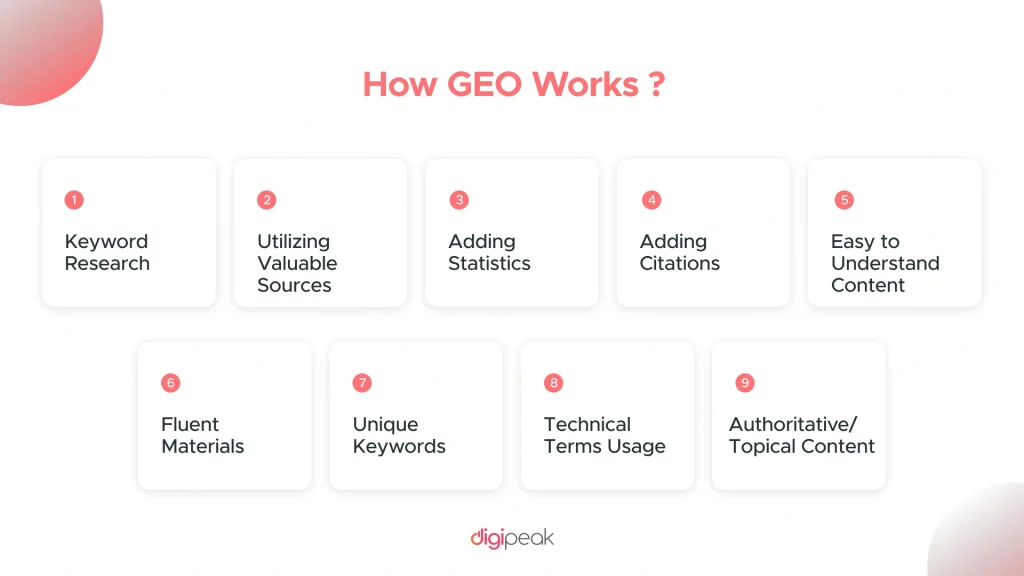
In the realm of AI-generated suggestions, competition for visibility in the top-ranked responses is fierce. This “winner-takes-all” scenario underscores the need for meticulously optimized content to not just rank but dominate in the generative search engine environment.
Evidence shows that using GEO strategies can lead to an average improvement of 30% in impressions.
This significant increase highlights the effectiveness of adapting content to meet the criteria preferred by generative engines, emphasizing the importance of authoritative sources, statistical data, and clear, fluent language in enhancing content visibility.
Research says: “Content creators need to make changes to their websites to improve impression metrics. A well-designed GEO method should increase the visibility of the website it’s applied to.”
What we need to do is not a completely foreign strategy; at the end of the day, what matters is good content. To elaborate on this, let’s examine various optimization strategies that content creators should use:
Take Advantage of Automation with Artificial Intelligence!
How can you use your time more efficiently? Artificial intelligence saves you time by automating repetitive tasks. Learn how you can leverage AI to accelerate your business processes.
Integrate relevant keywords throughout your content to align with classic SEO practices. However, it’s crucial to maintain natural flow and readability to avoid penalties from over-optimization.
Google’s search algorithms always prefer natural, user-focused content. According to Ahrefs’ 2022 report, organic keyword usage holds a significant place among ranking factors and positively impacts user experience.
Is Your E-Commerce Website Raking in Traffic but No Leads/Sales?
Get a Free Conversion Analysis Audit now!
Let's evaluate together how you can capture the attention of your target audience more effectively. The goal is to increase conversion rates ! Fill out the form now and get your free analysis report!
Enhance the credibility of your content by citing reliable sources. This practice not only validates your claims but also associates your content with established research or facts.
For example, citing the Content Marketing Institute can increase readers’ trust in your content and boost engagement.
Incorporate quantitative data to support your arguments. Using precise numbers can strengthen your points and make your content more persuasive and informative.
For instance, stating that “Digital marketing spending is expected to increase by 10% in 2024” emphasizes the seriousness and timeliness of your topic.
Add depth and authority to your content by including relevant quotes from experts or related sources. This can also provide your target audience with a different perspective.
For example, quoting industry leaders like Neil Patel or Seth Godin in a digital marketing article can make your writing more engaging.
Simplify complex concepts into understandable language. Making your content accessible to a broader audience increases engagement and reduces bounce rates.
For example, using straightforward language when explaining financial terms helps readers better understand the topic.
Ensure your website’s text flows smoothly and is free of grammatical errors. Well-crafted sentences improve readability and user experience.
Research by Grammarly shows that grammatical errors and poorly structured sentences increase the likelihood of readers leaving a site.
Enrich your content with specific, non-cliché words to make it stand out. This can enhance the uniqueness of your content and make it more engaging and memorable.
As noted in Moz’s SEO guide, unique words and phrases positively impact both user experience and SEO performance.
When appropriate, include technical terms to showcase expertise in your subject. This can help target a more specialized audience and improve SEO for niche queries.
For example, when writing about software development, explaining terms like “API integration” makes the topic more accessible.
Elevate your content with persuasive language and authoritative claims. This builds credibility and trust among your target audience, making your website a go-to resource in your field.
As the Content Marketing Institute points out, creating authoritative content is key to building brand credibility and a loyal readership.
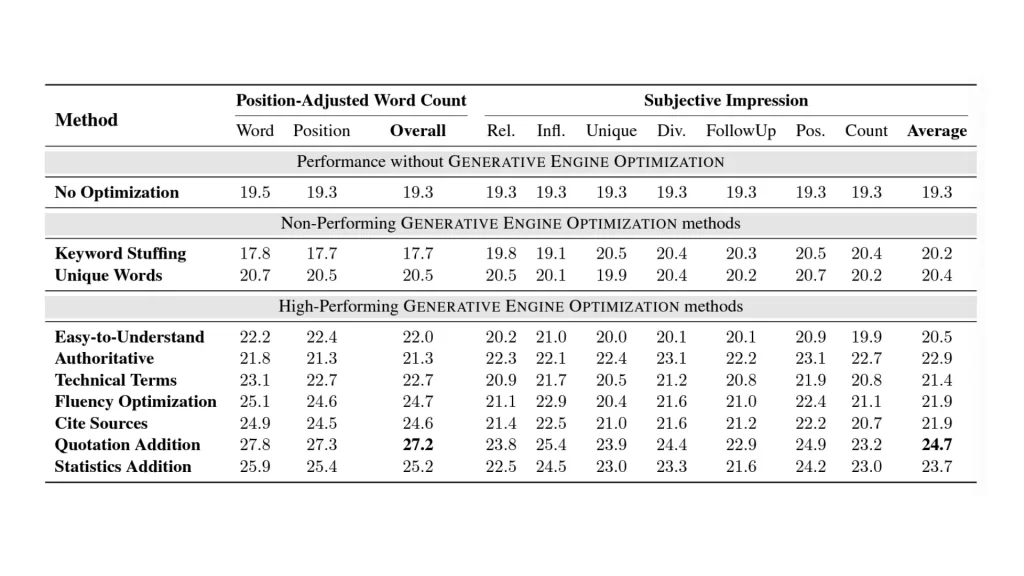
Source: GEO Study conducted by students at Princeton, Georgia Tech, Allen Institute for AI, and IIT Delhi.
The emergence of large language models like ChatGPT and Bard (now called Gemini) has ushered in a new era of search engines that synthesize information from various sources to provide comprehensive, conversational responses.
Optimizing your content for ChatGPT and Bard can significantly increase your visibility. Optimization for these generative engines involves adapting your content to be more persuasive, authoritative, and rich in relevant keywords and statistics.
In this new era of SEO x GEO, successfully leveraging these AI tools to recommend your products or services can lead to increased business. Our experiences confirm that adopting GEO strategies has already attracted clients looking to boost AI recommendations.
When it comes to GEO, brand mentions and relevance play a crucial role in determining search engine rankings.
NP Digital has also examined the factors that lead ChatGPT and Bard to recommend sites. If you want to optimize for ChatGPT, you should consider that their indexes are almost always up-to-date. Below is the table created by NP Digital:
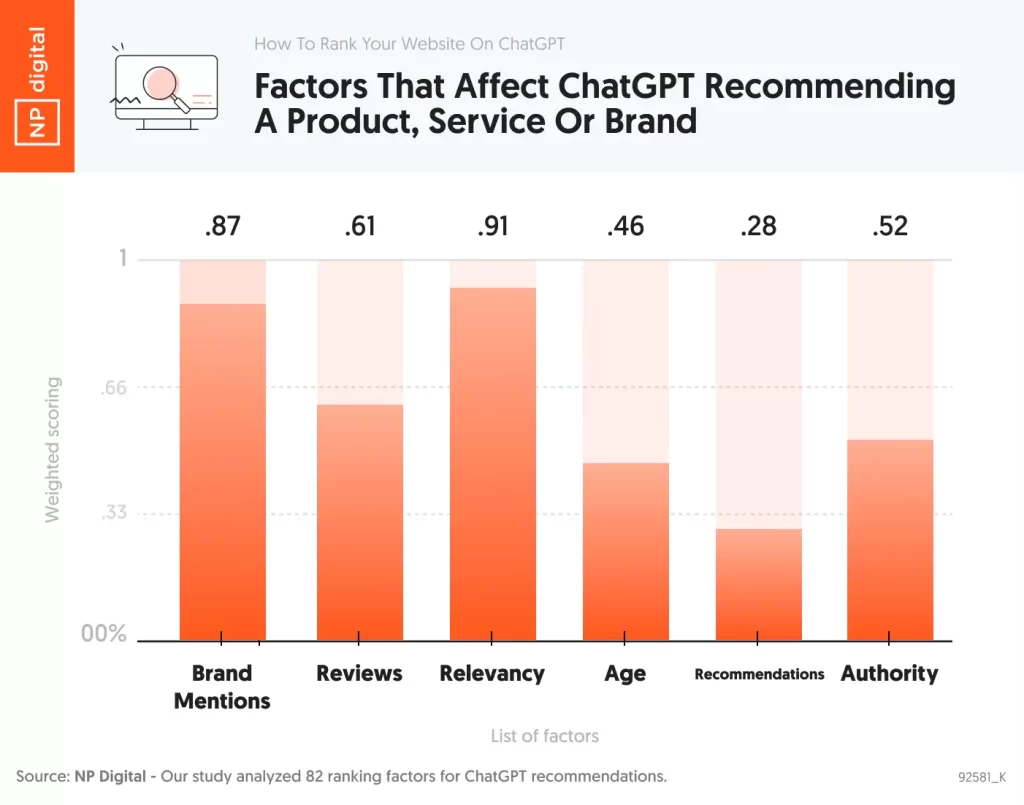
According to this chart, ChatGPT’s recommendation of a product, service, or brand depends on the following factors:
As we stand on the brink of a new era in digital search, it’s clear that generative engines and GEO are reshaping how content is discovered and consumed.
As content creators and marketers adapt to these changes, the focus should be on producing high-quality, reliable content that resonates with both generative engines and human audiences. The strategies outlined here serve as a foundation for understanding and leveraging the capabilities of these advanced systems.
The journey with GEO is just beginning, and its evolution promises to bring more innovation and challenges in the quest for digital visibility.
Strengthen your brand’s position in the online world with Digipeak’s SEO/GEO and Content services. Our comprehensive strategies will enable you to create content that appeals to both potential customers and generative engines.
Keeping up with the changing and evolving digital world is the key to success in the new era. At Digipeak, our entire team offers speed, planning, and success far beyond traditional solutions with expertise in the latest technology. Contact us now and discover the transformative power of data-driven work.
While SEO remains important for traditional search engines, GEO offers the advantage of optimizing content for AI-driven search engines. This can lead to increased visibility in AI-generated responses and potentially reach a wider audience.
Absolutely. In fact, it’s recommended to use both strategies to ensure maximum visibility across all types of search engines. SEO targets traditional search engines, while GEO focuses on AI-driven ones.
There are various online resources available to learn about GEO. You can start by reading research papers and articles on the topic, attending webinars, or enrolling in digital marketing courses that cover it.
Neither is more important than the other. Both have their unique advantages and target different types of search engines. The key is to understand the strengths of each and use them complementarily.
GEO proposes a set of impression metrics that measure the visibility of citations and their relevance to the user query. These metrics can help you evaluate the effectiveness of your GEO strategies.
It’s unlikely that GEO will completely replace SEO. While AI-powered search engines are becoming more prevalent, traditional search engines still play a significant role in how users find information online. Therefore, a balanced approach that includes both SEO and GEO is recommended.
Get an Offer


Join Us So You Don't
Miss Out on Digital Marketing News!
Join the Digipeak Newsletter.
Related Posts

The digital marketing ecosystem in 2026 is defined by a singular, disruptive question: Is the …
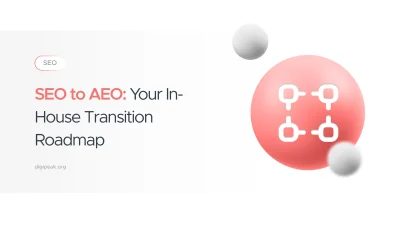
The era of "Ten Blue Links" is over. They are no longer the primary drivers …
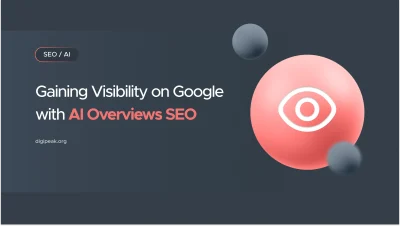
The digital marketing industry is currently navigating a fundamental transformation that makes previous shifts, such …
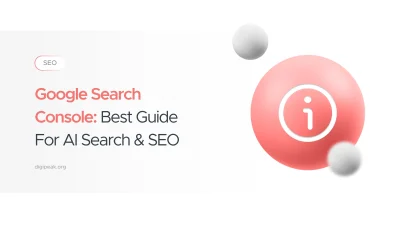
The digital marketing ecosystem has undergone a fundamental structural shift. For more than twenty years, …